
It took one virus to reshape the world’s priorities. Pay cuts, job loss, and financial stress are the new normal. Families are cutting back on non-essential spends, loan moratoriums are a relief to borrowers, and people are dipping into their emergency funds. At a time like this, why should anyone consider paying for a financial plan?
Job Loss & Pay Cuts
Those in the early stages of their career have the resilience to bounce back. Upskilling and seeking new opportunities are still on the table. Millennials have the chance to get their personal finance right early in their careers.
Senior employees find themselves caught between a rock and a hard place. Those close to retirement are in the last leg of their careers. Moving across the career lattice is out of the question due to freezing hires across industries. When companies downsize, they show their most expensive the door. It’s all the more important for those in the advanced stages of their career to prepare for early retirement or alternate careers.
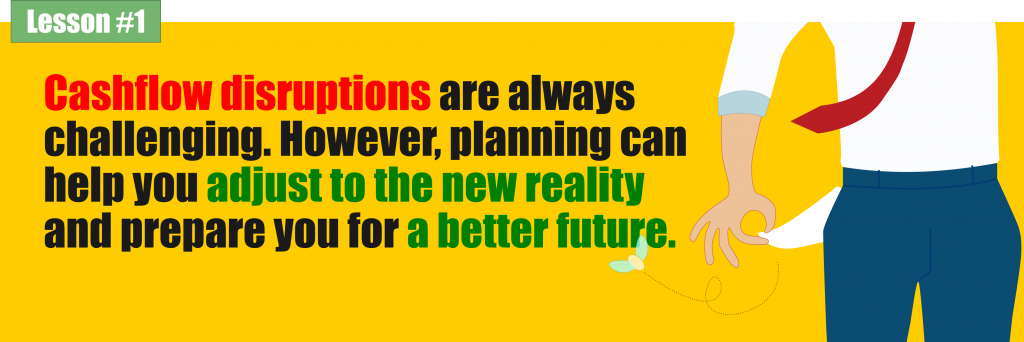
Personal Financial Planning
The pandemic has introduced chaos into our lives. Yet, our long-term goals haven’t changed at all. We still need to send our kids to college, pay off our loans, and retire comfortably. Short-term goals like planning a vacation or upgrading our vehicles have taken a back seat. This is the time to reset priorities.
Financial planning provides a clear view of assets, liabilities, commitments, and priorities.
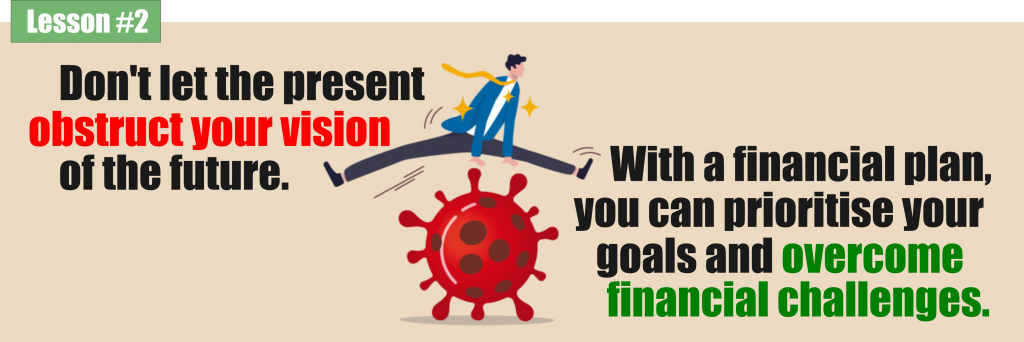
Household Budget
With strict lockdowns, discretionary spending has taken a hit. Consumer confidence will take time to revive. For most families, financial priorities are clear cut. Only essentials matter. We’ve also found a way to enjoy ourselves within a budget. Netflix and Amazon prime replace a night at the theatre. A home-cooked meal displaces a trip to a restaurant. Families are consciously putting off large expenses.
As we spend more time indoors, we realize the value of everyday items in our house. Life would be intolerable without a washing machine, fridge, television, or laptop. Accidents happen all the time – an unexpected fire or an electrical surge could leave these appliances out of order. These incidents could dent the household budget. Home insurance can minimize unexpected large expenses. These policies insure the house and its content.
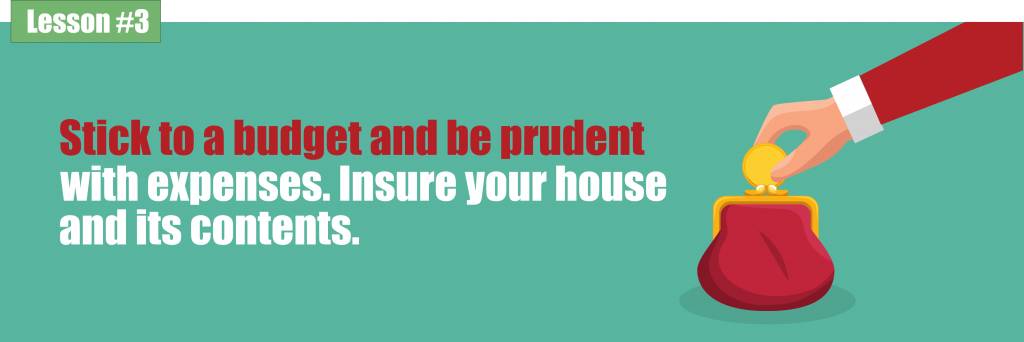
Health Insurance Cover
A pandemic is the best time to review health insurance needs. No one wants to foot a large medical bill amidst cashflow uncertainties. A company-sponsored policy is a great safety net, but it’s often not enough. Especially in a world where layoffs are common. An independent personal health insurance policy is non-negotiable.
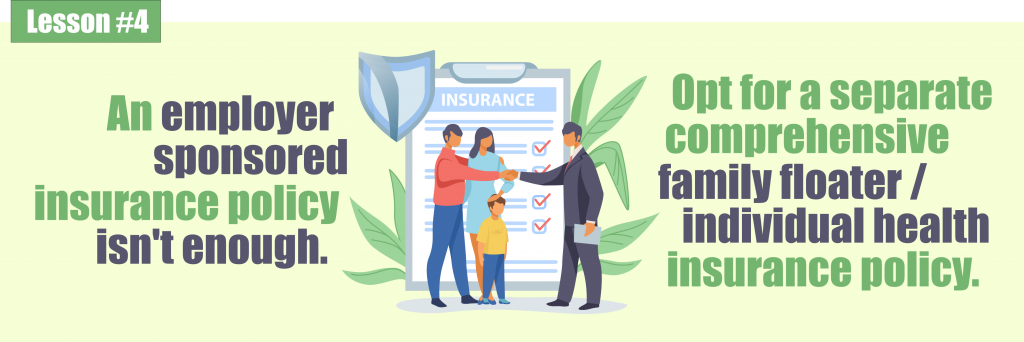
Emergency Fund
Insurance takes care of risk, but it doesn’t cover gaps in cash flows. Those dealing with layoffs or pay cuts need to bridge cash flows. Cutting back on expenses is the necessary first step. Dipping into emergency funds is another option. We build emergency funds for these rainy days. Being cautious and prudent with emergency funds is the responsible way to act.
If one doesn’t have an emergency fund, it’s time to create one. Channel any available savings as a priority towards this safety net. Maintain emergency funds in short-term bank fixed deposits, the savings bank account, or in liquid/ low duration mutual funds.
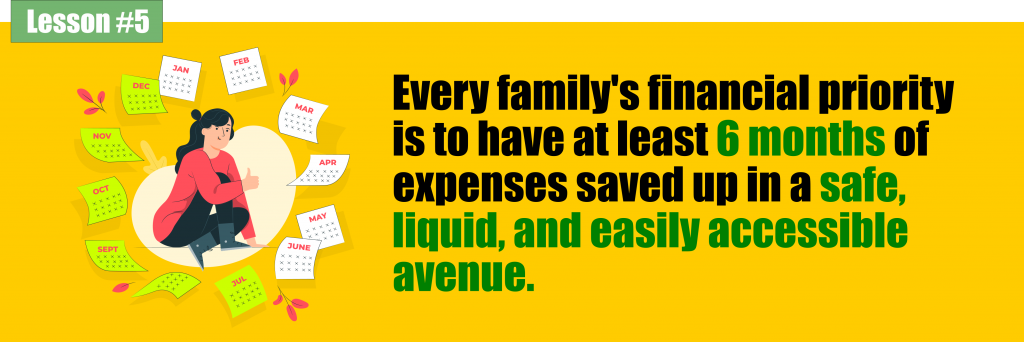
Loan Moratorium & EMI
Essentially, the RBI has directed banks to give leeway to borrowers to miss EMI until August 2020. This policy is known as the loan moratorium. Until recently, it was clear that the interest would accrue, and borrowers would end up paying more instalments or a higher EMI going forward. For now, borrowers who can afford to pay their EMIs should continue doing so. Education loans and home loans have tax benefits as well.
Borrowers may consider refinancing and renegotiating the interest rates on their loans. The RBI cut the repo rate by 1.15% this year. This makes fresh loans much cheaper for borrowers. Floating interest loans are reset every quarter. So, borrowers end up paying more principal if they keep the EMI constant.
Millennials with loans must find a way to keep repaying their loans. They must also avoid credit card debt and personal loans. These loans eat into wealth creation efforts. A side hustle, freelance, and part-time jobs can supplement cashflows. With fewer financial commitments, millennials must channel their energies into becoming debt-free.
Those closer to retirement should work towards zero debt. A job loss strains cashflows.
There’s no time like the present to manage your debt and bring it down. We have helped around 90 of our financial planning clients minimise their home loan interest payments. Every timely action can save at least a year’s EMI on the home loan.
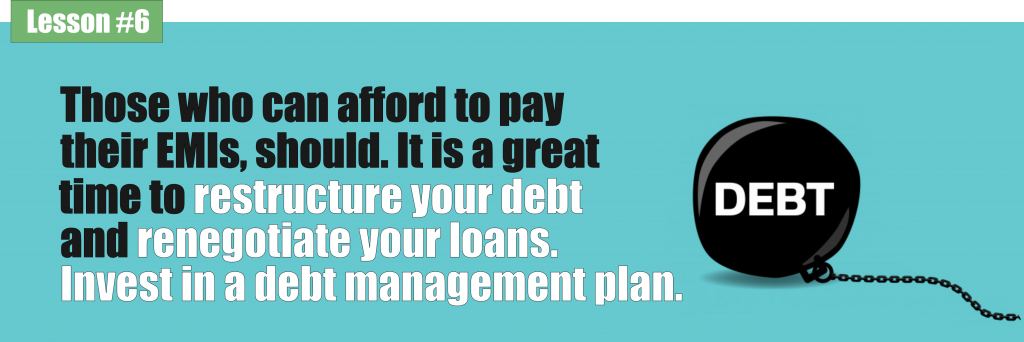
Retirement Savings & EPF
The EPF allows you to withdraw to fund financial emergencies, but it is also your retirement savings. Dipping into your EPF is a last resort measure. This is why it’s crucial to have an emergency fund, health insurance, and a budget in place.
Millennials must continue to save towards retirement. Investing during uncertain times is what brings outlier results. Those dreaming of early retirement and career switches need to save harder now to make those dreams happen.
Senior employees in their 50s need to evaluate their retirement savings. Cash and equivalent investments should comfortably provide for at least a couple of years. This ensures that there’s a buffer in case of layoffs and that there’s time to evaluate options. Some people may have to reprioritize financial goals. For instance, in the trade-off between providing for a child’s higher education and securing a retirement corpus – retirement may be a wise choice.
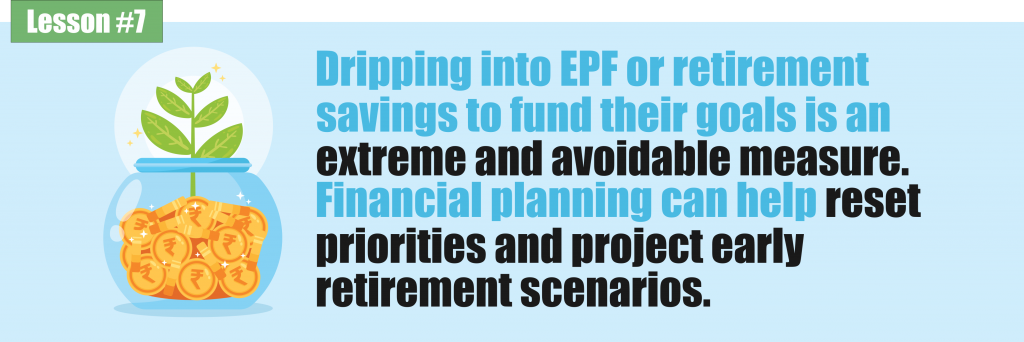
SIP & Investment Portfolio Review
The investment landscape in 2020 has changed quite drastically. Whenever the investment context morphs, the strategy and opportunities also change. An investment review is prudent for the following reasons:
- Liquidity: Exiting weaker investments generates liquidity. Redirect these proceeds towards emergency funds, settling debts, or future investments.
- Investment Opportunities: A review allows investors to build forward-looking portfolios. Realign investment decisions to current opportunities.
- Risk Management: In the current economic context industries struggle with existential pressures. Some companies may not weather the COVID storm – exiting these investments ensures some level of capital protection.
Even long-term investors are grappling with the question of returns. In a market and economy where the outlook is cloudy, a gradual and incremental approach to investing is recommended. A systematic investment plan is one of the best ways to achieve this. Investors should continue their SIPs. An investment review can help select funds that are more suited to the current context. SIP allows investors to follow sound asset allocation strategies. In the last year, we have helped more than 100 investors review their investments and adapt their investment strategies.

Financial plans create financial well-being. For someone dealing with a pay cut or a job loss, financial commitments can seem overwhelming. But with a comprehensive plan, they can find ways to cut back on expenses, avoid large unexpected costs, manage financial risks, save on interest costs, prepare for retirement, and create a healthy investment portfolio.